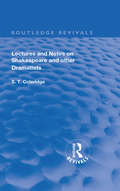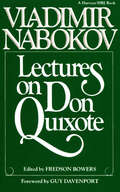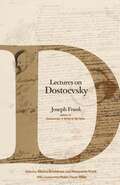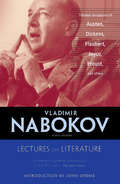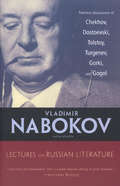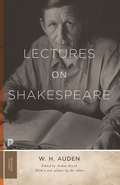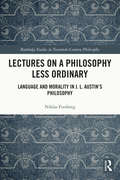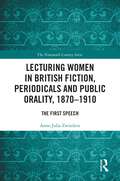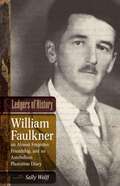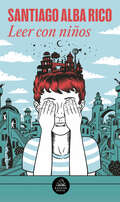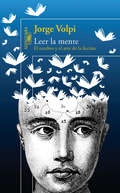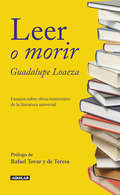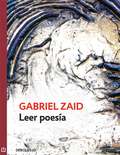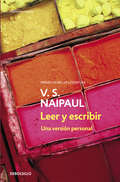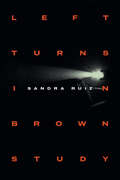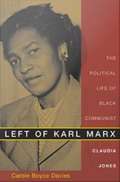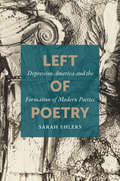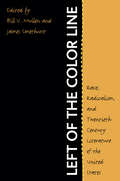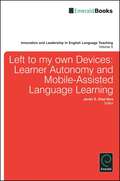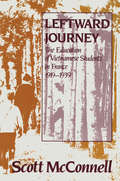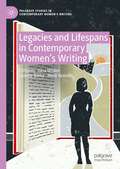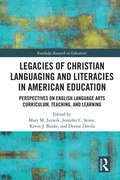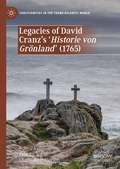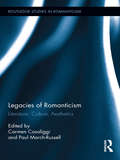- Table View
- List View
Lectures and Notes on Shakespeare and Other Dramatists. (Routledge Revivals)
by S.T ColeridgeThis book presents lectures and notes upon Shakespeare and other dramatists, including poetry, the drama and Shakespeare; order of Shakespeare's plays; notes on Shakespeare's plays from English history; and notes on some of the plays of Shakespeare, Johnson, Beaumont and Fletcher.
Lectures on Don Quixote
by Vladimir NabokovOne of the twentieth century&’s greatest novelists offers his take on the Spanish classic. The author of Lolita and Pale Fire was not only a master of fiction but a distinguished literary critic as well. In this collection of lectures, which he delivered at Harvard in the early 1950s, Vladimir Nabokov shares insights based on a chapter-by-chapter synopsis of the seventeenth-century novel by Miguel de Cervantes, a timeless classic and one of the most deeply influential works in all of Western literature. Rejecting the common interpretation of Don Quixote as a warm satire, Nabokov perceives the work as a catalog of cruelty through which the gaunt knight passes. Edited and with a preface by Fredson Bowers, this volume offers &“a powerful, critical, and dramatic elaboration of the theme of illusion&” (V. S. Pritchett, The New York Review of Books).
Lectures on Dostoevsky
by Joseph FrankFrom the author of the definitive biography of Fyodor Dostoevsky, never-before-published lectures that provide an accessible introduction to the Russian writer's major worksJoseph Frank (1918–2013) was perhaps the most important Dostoevsky biographer, scholar, and critic of his time. His never-before-published Stanford lectures on the Russian novelist's major works provide an unparalleled and accessible introduction to some of literature's greatest masterpieces. Presented here for the first time, these illuminating lectures begin with an introduction to Dostoevsky's life and literary influences and go on to explore the breadth of his career—from Poor Folk, The Double, and The House of the Dead to Notes from Underground, Crime and Punishment, The Idiot, and The Brothers Karamazov. Written in a conversational style that combines literary analysis and cultural history, Lectures on Dostoevsky places the novels and their key characters and scenes in a rich context. Bringing Joseph Frank’s unmatched knowledge and understanding of Dostoevsky's life and writings to a new generation of readers, this remarkable book will appeal to anyone seeking to understand Dostoevsky and his times.The book also includes Frank's favorite review of his Dostoevsky biography, "Joseph Frank's Dostoevsky" by David Foster Wallace, originally published in the Village Voice.
Lectures on Literature (Vib Ser. #Vol. 227)
by Vladimir NabokovThe acclaimed author of Lolita offers unique insight into works by James Joyce, Franz Kafka, Jane Austen, and others—with an introduction by John Updike. In the 1940s, when Vladimir Nabokov first embarked on his academic career in the United States, he brought with him hundreds of original lectures on the authors he most admired. For two decades those lectures served as the basis for Nabokov&’s teaching, first at Wellesley and then at Cornell, as he introduced undergraduates to the delights of great fiction. This volume collects Nabokov&’s famous lectures on Western European literature, with analysis and commentary on Charles Dickens&’s Bleak House, Gustav Flaubert&’s Madam Bovary, Marcel Proust&’s The Walk by Swann&’s Place, Robert Louis Stevenson&’s &“The Strange Case of Dr. Jekyll and Mr. Hyde,&” and other works. This volume also includes photographic reproductions of Nabokov&’s original notes, revealing his own edits, underlined passages, and more. Edited and with a Foreword by Fredson BowersIntroduction by John Updike
Lectures on Russian Literature
by Vladimir NabokovThe acclaimed author presents his unique insights into the works of great Russian authors including Tolstoy, Dostoevski, Gogol, Gorki, and Chekhov. In the 1940s, when Vladimir Nabokov first embarked on his academic career in the United States, he brought with him hundreds of original lectures on the authors he most admired. For two decades those lectures served as the basis for Nabokov&’s teaching, first at Wellesley and then at Cornell, as he introduced undergraduates to the delights of great fiction. This volume collects Nabokov&’s famous lectures on 19th century Russian literature, with analysis and commentary on Nikolay Gogol&’s Dead Souls and &“The Overcoat&”; Ivan Turgenev&’s Fathers and Sons; Maxim Gorki&’s &“On the Rafts&”; Leo Tolstoy&’s Anna Karenina and The Death of Ivan Ilych; two short stories and a play by Anton Chekhov; and several works by Fyodor Dostoevski, including Crime and Punishment, The Idiot, and The Possessed. This volume also includes Nabokov&’s lectures on the art of translation, the nature of Russian censorship, and other topics. Featured throughout the volume are photographic reproductions of Nabokov&’s original notes. &“This volume . . . never once fails to instruct and stimulate. This is a great Russian talking of great Russians.&” —Anthony Burgess Introduction by Fredson Bowers
Lectures on Shakespeare: Conferencias Sobre Shakespeare (Princeton Classics Ser. #45)
by W. H. AudenFrom one of the great modern writers, the acclaimed lectures in which he draws on a lifetime of experience to take the measure of Shakespeare's plays and sonnets "W. H. Auden, poet and critic, will conduct a course on Shakespeare at the New School for Social Research beginning Wednesday. Mr. Auden . . . proposes to read all Shakespeare's plays in chronological order." So the New York Times reported on September 27, 1946, giving notice of a rare opportunity to hear one of the century's great poets discuss at length one of the greatest writers of all time. Reconstructed by Arthur Kirsch, these lectures offer remarkable insights into Shakespeare's plays and sonnets while also adding immeasurably to our understanding of Auden.
Lectures on a Philosophy Less Ordinary: Language and Morality in J.L. Austin’s Philosophy (Routledge Studies in Twentieth-Century Philosophy)
by Niklas ForsbergThis book offers a comprehensive reinterpretation of J.L. Austin’s philosophy. It opens new ways of thinking about ethics and other contemporary issues in the wake of Austin’s philosophical work. Austin is primarily viewed as a philosopher of language whose work focused on the pragmatic aspects of speech. His work on ordinary language philosophy and speech act theory is seen as his main contribution to philosophy. This book challenges this received view to show that Austin used his most well-known theoretical notions as heuristic tools aimed at debunking the fact/value dichotomy. Additionally, it demonstrates that Austin’s continual returns to the ordinary is rooted in a desire to show that our lives in language are complicated and multifaceted. What emerges is an attempt to think with Austin about problems that are central to philosophy today—such as the question about linguistic inheritance, truth, the relationship between a language inherited and morality, and how we are to cope with linguistic elasticity and historicity. Lectures on a Philosophy Less Ordinary will appeal to scholars and advanced students working on Austin’s philosophy, philosophy of language, and the history of analytic philosophy.
Lecturing Women in British Fiction, Periodicals and Public Orality, 1870–1910: The First Speech (The Nineteenth Century Series)
by Anne-Julia ZwierleinThis book examines the emergence of women as audiences and speakers on the British metropolitan lecture circuit and in mass print representations from 1870 to 1910. Bringing together research on Victorian lecturing, periodicals, voice studies and the cultural history of feminism, it sheds new light on the interdependence of orality and print and the rise of the British women’s movement.Sifting through the archives of lecture institutions (the Birkbeck Literary and Scientific Institution, the London Institution and the Royal Institution), penny fiction weeklies and feminist weeklies, New Woman and suffrage novels, autobiographical writings and rhetorical manuals, this book reconstructs the changing mediascape of late Victorian London and treats speech events, in print and on site, as catalysts for democratic participation. Undertaking an archaeology of women’s presence in the lecture hall, it explores conservative fantasies in fiction of the female speaking automaton alongside new writings that transformed women orators from objects of sensation into public agents. By analysing women’s collective self-education in rhetoric and elocution, this book traces the emergence in political fictions of key narrative tropes of oral performance: the surprise encounter in the lecture hall, the moment of conversion during a lecture and the symbolic ‘first speech’ of new suffrage recruits.Drawing on new and extensive primary research, this book intervenes in several flourishing fields of inquiry: literary studies, oral culture studies, sound and voice studies, performance studies, periodical studies and Victorian and Edwardian cultural history.
Ledgers of History: William Faulkner, an Almost Forgotten Friendship, and an Antebellum Plantation Diary (Southern Literary Studies)
by Sally WolffEmory University professor Sally Wolff has carried on a fifty-year tradition of leading students on expeditions to "Faulkner country" in and around Oxford, Mississippi. Not long ago, she decided to invite alumni on one of these field trips. One response to the invitation surprised her: "I can't go on the trip. But I knew William Faulkner." They were the words of Dr. Edgar Wiggin Francisco III, and in talking with Wolff he revealed that as a child in the 1930s and 1940s he did indeed know Faulkner quite well. His father and Faulkner maintained a close friendship for many years, going back to their shared childhood, but the fact of their friendship has been unrecognized because the two men saw much less of each other after the early years of their marriages. In Ledgers of History, Wolff recounts her conversations with Dr. Francisco -- known to Faulkner as "Little Eddie" -- and reveals startling sources of inspiration for Faulkner's most famous works.Dr. Francisco grew up at McCarroll Place, his family's ancestral home in Holly Springs, Mississippi, thirty miles north of Oxford. In the conversations with Wolff, he recalls that as a boy he would sit and listen as his father and Faulkner sat on the gallery and talked about whatever came to mind. Francisco frequently told stories to Faulkner, many of them oft-repeated, about his family and community, which dated to antebellum times. Some of these stories, Wolff shows, found their way into Faulkner's fiction.Faulkner also displayed an absorbing interest in a seven-volume diary kept by Dr. Francisco's great-great-grandfather Francis Terry Leak, who owned extensive plantation lands in northern Mississippi before the Civil War. Some parts of the diary recount incidents in Leak's life, but most of the diary concerns business transactions, including the buying and selling of slaves and the building of a plantation home. During his visits over the course of decades, Francisco recalls, Faulkner spent many hours poring over these volumes, often taking notes. Wolff has discovered that Faulkner apparently drew some of the most important material in several of his greatest works, including Absalom, Absalom! and Go Down, Moses, at least in part from the diary.Through Dr. Francisco's vivid childhood recollections, Ledgers of History offers a compelling portrait of the future Nobel Laureate near the midpoint of his legendary career and also charts a significant discovery that will inevitably lead to revisions in historical and critical scholarship on Faulkner and his writings.
Leer con niños
by Santiago Alba RicoUn libro puede cambiar el mundo. Freud convenció a la tradición literaria occidental de que todos los niños quieren matar a sus padres cuando lo que en realidad nos cuenta la historia de Edipo -como varias decenas de mitos y relatos populares- es, al revés, que son los padres, o al menos los reyes, los que quieren matar, devorar o abandonar a sus hijos. Este libro, que cabalga entre el ensayo y la ficción, parte de una experiencia singular: la lectura compartida de la literatura sin etiquetas: Homero, Dickens, Canetti, Dante, Salinger... A partir de ahí plantea y responde a dos preguntas inseparables: «¿Para qué sirven los niños?» y «¿Para qué sirven los libros?». En una sociedad dominada por «solteros sin imaginación», en la que la infancia, exaltada en un escaparate, se ha vuelto más vulnerable que nunca y en la que la discontinuidad del niño y la continuidad del relato están radicalmente amenazadas, Santiago AlbaRico reivindica una especie de nuevo compromiso «materno» que una, como en la experiencia de Sherezade, los Cuentos y los Niños. De ello depende la educación, no de Edipo, sino de Layo; es decir, la educación de los asesinos. La crítica ha dicho...«Leer con niños va de niños y de libros, pero mucho más del niño que los adultos llevamos dentro, sin que falte el adulto que los niños llevan dentro.»El Mundo «Habla de la gente que defiende su tiempo para leer, de la vida en una época bárbara que pretende acabar con los relatos de carne y hueso, de las nuevas formas virtuales de dominación, de la pobreza, de las prisas crueles de un capitalismo que nos impone hábitos de solteros y de huérfanos.»Luís García Montero «Un libro cautivador y excitante, repleto de destellos: un libro valientemente interpelador en el que destacan las observaciones muy delicadas sobre los niños, fruto de una atención apasionada y amorosa.»IgnacioEchevarría, El Mercurio «Un libro delicado y brutal sobre para qué sirven los niños y, por lo tanto, para qué sirve la diferencia entre lo bueno y lo malo, lo horrible y lo maravilloso. Un libro necesario cuando esas diferencias parecen confusas a tantas personas.»Belén Gopegui «Tras muchos años de haber combatido la escuela y la familia como aparatos de reproducción ideológica, este libro vuelve a reivindicarlas desde la izquierda como espacios de resistencia.»Rebelión.org «Este ensayo sobre el papel de la literatura y la educación en la jungla salvaje del capitalismo contiene pistas impagables y preguntas inquietantes.»Javier Rodríguez Marcos, El País «Leer con niños [...] fluctúa entre el ensayo, la literatura, el periodismo y la autobiografía con una fluidez deslumbrante.»Darwin Palermo «Leer con niños es un tratado puro (y a veces duro) de ética y filosofía política, pero animado por un contagioso ritmo literario.»Alba Rico, Babelia, El País
Leer con niños
by Santiago Alba RicoUn libro puede cambiar el mundo. Freud convenció a la tradición literaria occidental de que todos los niños quieren matar a sus padres cuando lo que en realidad nos cuenta la historia de Edipo -como varias decenas de mitos y relatos populares- es, al revés, que son los padres, o al menos los reyes, los que quieren matar, devorar o abandonar a sus hijos. Este libro, que cabalga entre el ensayo y la ficción, parte de una experiencia singular: la lectura compartida de la literatura sin etiquetas: Homero, Dickens, Canetti, Dante, Salinger... A partir de ahí plantea y responde a dos preguntas inseparables: «¿Para qué sirven los niños?» y «¿Para qué sirven los libros?». En una sociedad dominada por «solteros sin imaginación», en la que la infancia, exaltada en un escaparate, se ha vuelto más vulnerable que nunca y en la que la discontinuidad del niño y la continuidad del relato están radicalmente amenazadas, Santiago Alba Rico reivindica una especie de nuevo compromiso «materno» que una, como en la experiencia de Sherezade, los Cuentos y los Niños. De ello depende la educación, no de Edipo, sino de Layo; es decir, la educación de los asesinos. La crítica ha dicho...«Leer con niños va de niños y de libros, pero mucho más del niño que los adultos llevamos dentro, sin que falte el adulto que los niños llevan dentro.»El Mundo«Habla de la gente que defiende su tiempo para leer, de la vida en una época bárbara que pretende acabar con los relatos de carne y hueso, de las nuevas formas virtuales de dominación, de la pobreza, de las prisas crueles de un capitalismo que nos impone hábitos de solteros y de huérfanos.»Luís García Montero «Un libro cautivador y excitante, repleto de destellos: un libro valientemente interpelador en el que destacan las observaciones muy delicadas sobre los niños, fruto de una atención apasionada y amorosa.»Ignacio Echevarría, El Mercurio «Un libro delicado y brutal sobre para qué sirven los niños y, por lo tanto, para qué sirve la diferencia entre lo bueno y lo malo, lo horrible y lo maravilloso. Un libro necesario cuando esas diferencias parecen confusas a tantas personas.»Belén Gopegui «Tras muchos años de haber combatido la escuela y la familia como aparatos de reproducción ideológica, este libro vuelve a reivindicarlas desde la izquierda como espacios de resistencia.»Rebelión.org «Este ensayo sobre el papel de la literatura y la educación en la jungla salvaje del capitalismo contiene pistas impagables y preguntas inquietantes.»Javier Rodríguez Marcos, El País«Leer con niños [...] fluctúa entre el ensayo, la literatura, el periodismo y la autobiografía con una fluidez deslumbrante.»Darwin Palermo «Leer con niños es un tratado puro (y a veces duro) de ética y filosofía política, pero animado por un contagioso ritmo literario.»Alba Rico, Babelia, El País
Leer la mente: El cerebro y el arte de la ficción
by Jorge VolpiEn este brillante y provocador ensayo, Jorge Volpi destierra la vieja idea de la ficción como entretenimiento y sostiene, por el contrario, que las novelas y los cuentos han sido esenciales para la evolución de la especie humana. Del reconocido escritor Jorge Volpi, autor de No será la Tierra y ganador del Premio Iberoamericano José Donoso por el conjunto de su obra. Un brillante y provocador ensayo, donde Jorge Volpi entrelaza ciencia y literatura y demuestra que todos somos ficciones y que la literatura es una de las claves de nuestra identidad individual y nuestras pasiones compartidas. ¿Qué pasa en mi cerebro cuando leo una novela o un cuento? ¿Cómo y cuándo aparecieron? ¿Qué parte de la mente inventa las anécdotas felices o los desenlaces trágicos? ¿Por qué sufrimos o gozamos con los personajes de los relatos y de qué forma nosotros, los lectores, nos transformamos en esos personajes? ¿No es acaso el yo nuestra mayor invención? Del descubrimiento de las neuronas espejo al origen de la conciencia y las emociones, y de las trampas de la memoria a los laberintos de la inteligencia, el autor de En busca de Klingsor y No será la Tierra, Jorge Volpi, refrenda su voluntad de entrelazar ciencia y literatura. Al final, Leer la mente demuestra que todos somos ficciones y que la literatura es una de las claves de nuestra identidad individual y nuestras pasiones compartidas.
Leer o morir: Ensayos sobre obras inmortales de la literatura universal
by Guadalupe LoaezaLeer o morir es una gran invitación a entrar en los misterios y grandezas de la literatura, una ventana noble donde sabremos de autores y obras que marcaron el espíritu de millones de personas. De Guadalupe Loaeza, autora de Las reinas de Polanco, Primero las damas y Compro, luego existo. Ensayos breves de las obras inmortales de la literatura mundial; genios de la literatura universal que debes de leer antes de morir. Matilde, el personaje femenino de Rojo y negro corta un rizo de su hermoso cabello rubio para darlo a su amado, como prueba de su entrega... la mujer enamorada de La dama del perrito se da cuenta, cuando por fin se reúne con su amante en el hotel, que un abismo de incertidumbre se abre ante ella... ¿quién asesinó realmente al padre de los Karamazov en la genial novela de Dostoievski?... una niña redacta páginas conmovedoras sobre la guerra, laesperanza, el miedo, las ilusiones, en El diario de Ana Frank... ¿encontrará el lector a la Maga de Julio Cortázar? ¿Se conmoverá con el París de los años sesenta, con el jazz, la bohemia y los sueños llenos de ternura? Cuántas historias y enormes deseos, añoranzas, aventuras, amores, traiciones, intrigas, desvelos, horrores, pasiones... nos dejan los libros. En sus páginas la vida se desdobla y nos invita a recorrer otros caminos, nuevas ilusiones, vivir intensamente en otras épocas y latitudes. Con el estilo dinámico, entretenido y lleno de datos precisos y reveladores, que caracteriza la escritura de Guadalupe Loaeza, daremos un paseo por las grandes obras de la literatura universal como El Principito, El lobo estepario, El retrato de Dorian Gray, Ana Karenina, Madame Bovary, El extranjero...sabremos de las inquietudes y obsesiones de Edgar Allan Poe, Carlos Fuentes, Marguerite Yourcenar, Lewis Carroll, Marcel Proust, Albert Cohen, José Saramago, José Emilio Pacheco, J. M. G. Le Clézio ¡y muchos más! Leer o morir es más que un libro amable de recomendaciones y gustos literarios, es una invitación a que siempre, en cualquier momento y circunstancia, el libro sea nuestro amigo más cercano, y generoso.
Leer poesía
by Gabriel ZaidEn este volumen, integrado por ensayos breves, concentrados y aleccionadores, Gabriel Zaid enfoca su atención siempre viva, su inteligencia siempre despierta, en poetas individuales, movimientos poéticos y aspectos de la poesía y su peculiar estética. Leer por gusto es el método que propone este libro que habla de poesía como los amigos que salen platicando de ver una película. Puede servir como una introducción al arte de leer poesía, especialmente mexicana, pero no es un tratado, sino una conversación de lector a lector. Octavio Paz, Ramón Xirau, Carlos Fuentes y Salvador Elizondo dieron el Premio Villaurrutia a Leer poesía en 1972. Esta nueva versión incluye artículos publicados de 1966 a 2009. "A la curiosidad con que se acerca a los temas junta la franqueza en las opiniones." Alí Chumacero "Todas las páginas de Leer poesía muestran ingenio, perspicacia, lucidez." Jaime García Terrés "Juicios rápidos y casi siempre certeros: Zaid duda de Reyes poeta pero no lo niega; se entusiasma con razón por la poesía de los judíos españoles; nos llega a convencer de que 'El brindis del bohemio' es mejor (menos malo) que el 'Nocturno a Rosario'; escribe la nota más inteligente que se haya escrito sobre la poesía de Isabel Fraire." Tomás Segovia
Leer y escribir: Una versión personal
by V.S. NaipaulEn Leer y escribir, Naipaul pasa revista a su relación con la lectura y con el hecho de escribir. En esta breve narración, escrita desde la memoria más personal, el autor pasa revista a su relación con el libro y con el hecho de escribir. Desde sus primeras lecturas (por ejemplo, Veinte mil lenguas de viaje submarino) hasta su relación con la escritura y su concepción de la labor del escritor. Un texto sencillo en el que, partiendo de sus impresiones, el autor nos acerca sin ninguna dificultad a su mundo y a sus percepciones personales. Todo ello conforma el fresco de una vida dedicada a la escritura, desde los difíciles comienzos de la década de 1950 hasta la actualidad. La memoria de un aprendizaje interior y exterior que refleja las dificultades propias de haber vivido en una tradición básicamente oral como la cultura hindú. En unos tiempos en los que se cuestiona cuál es el papel de la lectura y la escritura en la vida de los seres humanos, V. S. Naipaul, premio Nobel de Literatura ofrece una respuesta personal, apasionada y original. Reseña:«Naipaul es el único gran escritor inglés que vale la pena leer.»Guillermo Cabrera Infante, El Cultural
Left Turns in Brown Study (Writing Matters!)
by Sandra RuizIn Left Turns in Brown Study Sandra Ruiz offers a poetic-theoretical inquiry into the interlacing forms of study and mourning. Drawing on Black and Brown activism and theory, Ruiz interweaves poetry, memoir, lyrical essay, and vignettes to examine study as an emancipatory practice. Proposing “brown study” as key for understanding how Brownness harbors loss and suffering along with the possibility for more abundant ways of living, Ruiz invites readers to turn left into the sounds, phrases, and principles of anticolonial ways of reading, writing, citing, and listening. In doing so, Ruiz engages with a panoply of hauntings, ghosts, and spectral presences, from deceased teachers, illiterate ancestors, and those lost to unnatural disasters to all those victims of institutional and colonial violence. Study is shared movement and Brownness lives in citation. Conceptual, poetic, and unconventional, this book is crucial for all those who theorize minoritarian literary aesthetics and think through utopia, queer possibility, and the entwinement of forms.
Left of Karl Marx: The Political Life of Black Communist Claudia Jones
by Carole Boyce DaviesIn Left of Karl Marx, Carole Boyce Davies assesses the activism, writing, and legacy of Claudia Jones (1915-1964), a pioneering Afro-Caribbean radical intellectual, dedicated communist, and feminist. Jones is buried in London's Highgate Cemetery, to the left of Karl Marx--a location that Boyce Davies finds fitting given how Jones expanded Marxism-Leninism to incorporate gender and race in her political critique and activism. Claudia Cumberbatch Jones was born in Trinidad. In 1924, she moved to New York, where she lived for the next thirty years. She was active in the Communist Party from her early twenties onward. A talented writer and speaker, she traveled throughout the United States lecturing and organizing. In the early 1950s, she wrote a well-known column, "Half the World," for the Daily Worker. As the U. S. government intensified its efforts to prosecute communists, Jones was arrested several times. She served nearly a year in a U. S. prison before being deported and given asylum by Great Britain in 1955. There she founded The West Indian Gazette and Afro-Asian Caribbean News and the Caribbean Carnival, an annual London festival that continues today as the Notting Hill Carnival. Boyce Davies examines Jones's thought and journalism, her political and community organizing, and poetry that the activist wrote while she was imprisoned. Looking at the contents of the FBI file on Jones, Boyce Davies contrasts Jones's own narration of her life with the federal government's. Left of Karl Marx establishes Jones as a significant figure within Caribbean intellectual traditions, black U. S. feminism, and the history of communism.
Left of Poetry: Depression America and the Formation of Modern Poetics
by Sarah EhlersIn this incisive study, Sarah Ehlers returns to the Depression-era United States in order to unsettle longstanding ideas about poetry and emerging approaches to poetics. By bringing to light a range of archival materials and theories about poetry that emerged on the 1930s left, Ehlers reimagines the historical formation of modern poetics. Offering new and challenging readings of prominent figures such as Langston Hughes, Muriel Rukeyser, and Jacques Roumain, and uncovering the contributions of lesser-known writers such as Genevieve Taggard and Martha Millet, Ehlers illuminates an aesthetically and geographically diverse matrix of schools and movements. Resisting the dismissal of thirties left writing as mere propaganda, the book reveals how communist-affiliated poets experimented with poetic modes—such as lyric and documentary—and genres, including songs, ballads, and nursery rhymes, in ways that challenged existing frameworks for understanding the relationships among poetic form, political commitment, and historical transformation. As Ehlers shows, Depression left movements and their international connections are crucial for understanding both the history of modern poetry and the role of poetic thought in conceptualizing historical change.
Left of the Color Line
by James Smethurst Bill V. MullenThis collection of fifteen new essays explores the impact of the organized Left and Leftist theory on American literature and culture from the 1920s to the present. In particular, the contributors explore the participation of writers and intellectuals on the Left in the development of African American, Chicano/Chicana, and Asian American literature and culture. By placing the Left at the center of their examination, the authors reposition the interpretive framework of American cultural studies. Tracing the development of the Left over the course of the last century, the essays connect the Old Left of the pre-World War II era to the New Left and Third World nationalist Left of the 1960s and 1970s, as well as to the multicultural Left that has emerged since the 1970s. Individual essays explore the Left in relation to the work of such key figures as Ralph Ellison, T. S. Eliot, Chester Himes, Harry Belafonte, Americo Paredes, and Alice Childress. The collection also reconsiders the role of the Left in such critical cultural and historical moments as the Harlem Renaissance, the Cold War, and the Black Arts Movement of the 1960s and 1970s. The contributors are Anthony Dawahare, Barbara Foley, Marcial Gonzalez, Fred Ho, William J. Maxwell, Bill V. Mullen, Cary Nelson, B. V. Olguin, Rachel Rubin, Eric Schocket, James Smethurst, Michelle Stephens, Alan Wald, and Mary Helen Washington. Contributors:Anthony Dawahare, California State University, Northridge (Northridge, Calif.)Barbara Foley, Rutgers University (Newark, N.J.)Marcial Gonzalez, University of California, Berkeley (Berkeley, Calif.)Fred Ho, New York, N.Y.William J. Maxwell, University of Illinois at Urbana-Champaign (Urbana-Champaign, Ill.)Bill V. Mullen, University of Texas at San Antonio (San Antonio, Tex.)Cary Nelson, University of Illinois at Urbana-Champaign (Urbana-Champaign, Ill.)B. V. Olguin, University of Texas at San Antonio (San Antonio, Tex.)Rachel Rubin, University of Massachusetts-Boston (Boston, Mass.)Eric Schocket, Hampshire College (Amherst, Mass.)James Smethurst, University of Massachusetts-Amherst (Amherst, Mass.)Michelle Stephens, Mount Holyoke College (South Hadley, Mass.)Alan Wald, University of Michigan (Ann Arbor, Mich.)Mary Helen Washington, University of Maryland (College Park, Md.)-->
Left to My Own Devices: Learner Autonomy and Mobile-Assisted Language Learning
by Javier E. Díaz-VeraThis book is the result of five years of intensive dedication to teaching innovation and curriculum development and offers a series of studies exploring how mobile technologies in particular, and mobile learning in general, may be used for second language teaching and learning in a wide variety of environments.
Leftward Journey: Education of Vietnamese Students in France
by Scott McConnellFirst Published in 2018. Routledge is an imprint of Taylor & Francis, an Informa company.
Legacies and Lifespans in Contemporary Women’s Writing (Palgrave Studies in Contemporary Women’s Writing)
by Gina Wisker Heidi Yeandle Leanne BibbyThis book examines the connections and conversations between women writers from the twentieth century and the twenty-first century. The essays consider the ways in which twenty-first-century women writers look back and respond to their predecessors within the field of contemporary women’s writing. The book looks back to the foundations of contemporary women’s writing and also considers how this category may be defined in future decades. We ask how writers and readers have interpreted ‘the contemporary’, a moving target and an often-contentious term, especially in light of feminist theory and criticism of the late twentieth century. Writing about the relationships between women’s writings is an always-vital, ongoing political project with a rich history. These essays argue that establishing and defining the contemporary is, for women writers, another ongoing political project to which this collection of essays aims, in part, to contribute.
Legacies of Christian Languaging and Literacies in American Education: Perspectives on English Language Arts Curriculum, Teaching, and Learning (Routledge Research in Education)
by Kevin J. Burke Mary M. Juzwik Jennifer C. Stone Denise DávilaBecause spiritual life and religious participation are widespread human and cultural phenomena, these experiences unsurprisingly find their way into English language arts curriculum, learning, teaching, and teacher education work. Yet many public school literacy teachers and secondary teacher educators feel unsure how to engage religious and spiritual topics and responses in their classrooms. This volume responds to this challenge with an in-depth exploration of diverse experiences and perspectives on Christianity within American education. Authors not only examine how Christianity – the historically dominant religion in American society – shapes languaging and literacies in schooling and other educational spaces, but they also imagine how these relations might be reconfigured. From curricula to classroom practice, from narratives of teacher education to youth coming-to-faith, chapters vivify how spiritual lives, beliefs, practices, communities, and religious traditions interact with linguistic and literate practices and pedagogies. In relating legacies of Christian languaging and literacies to urgent issues including White supremacy, sexism and homophobia, and the politics of exclusion, the volume enacts and invites inclusive relational configurations within and across the myriad American Christian sub-cultures coming to bear on English language arts curriculum, teaching, and learning. This courageous collection contributes to an emerging scholarly literature at the intersection of language and literacy teaching and learning, religious literacy, curriculum studies, teacher education, and youth studies. It will speak to teacher educators, scholars, secondary school teachers, and graduate and postgraduate students, among others.
Legacies of David Cranz's 'Historie von Grönland' (Christianities in the Trans-Atlantic World)
by Christina Petterson Felicity JenszThis book brings together interdisciplinary scholars from history, theology, folklore, ethnology and meteorology to examine how David Cranz’s Historie von Grönland (1765) resonated in various disciplines, periods and countries. Collectively the contributors demonstrate the reach of the book beyond its initial purpose as a record of missionary work, and into secular and political fields beyond Greenland and Germany. The chapters also reveal how the book contributed to broader discussions and conceptualizations of Greenland as part of the Atlantic world. The interdisciplinary scope of the volume allows for a layered reading of Cranz’s book that demonstrates how different meanings could be drawn from the book in different contexts and how the book resonated throughout time and space. It also makes the broader argument that the construction of the Artic in the eighteenth century broadened our understanding of the Atlantic.
Legacies of Romanticism: Literature, Culture, Aesthetics (Routledge Studies in Romanticism)
by Carmen Casaliggi Paul March-RussellThis book visits the Romantic legacy that was central to the development of literature and culture from the 1830s onward. Although critical accounts have examined aspects of this long history of indebtedness, this is the first study to survey both Nineteenth and Twentieth century culture. The authors consider the changing notion of Romanticism, looking at the diversity of its writers, the applicability of the term, and the ways in which Romanticism has been reconstituted. The chapters cover relevant historical periods and literary trends, including the Romantic Gothic, the Victorian era, and Modernism as part of a dialectical response to the Romantic legacy. Contributors also examine how Romanticism has been reconstituted within postmodern and postcolonial literature as both a reassessment of the Modernist critique and of the imperial contexts that have throughout this time-frame underpinned the Romantic legacy, bringing into focus the contemporaneity of Romanticism and its political legacy. This collection reveals the diversity and continuing relevance of the genre in new and exciting ways, offering insights into writers such as Browning, Ruskin, Pater, Wilde, Lewis, MacNeice, and Auster.
